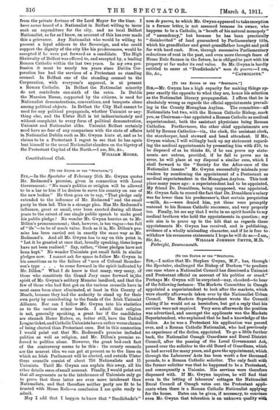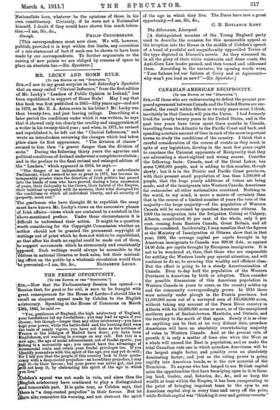ITO THE EDITOR OF THE "SPECTATOR.
SIR,—I notice that Mr. Stephen Gwynn, M.P., has, through I the Spectator, challenged the Bishop of Durham "to produce one case where a Nationalist Council has dismissed a Unionist and Protestant official on account of his politics or creed." Perhaps Mr. Gwynn will be surprised—nay, shocked—to hear of the following instance : The Markets Committee in Omagh appointed a superintendent to look after the markets, 'which were shortly afterwards taken over by the Nationalist Urban Council. The Markets Superintendent wrote the Council asking if he would act as heretofore, but got a reply that his services were not required. Very soon afterwards the position was advertised, and amongst the applicants was the Markets Superintendent, who explained that he had a knowledge of the duties. As he was a Protestant his application was passed over, and a Roman Catholic Nationalist, who had previously , no experience of the duties, appointed. To go a little further back, the Nationalist Omagh Guardians and Rural District Council, after the passing of the Local Government Act, passed over the solicitor to the old Board of Guardians, which• he had served for many years, and gave the appointment, which through the Labourers' Acts has been worth a few thousand pounds, to a Roman Catholic solicitor. The only fault with the former solicitor was that he happened to be a Protestant', and consequently a Unionist. His services were therefore dispensed with. If Mr. Gwynn inquires, he will find that even in the letting of labourers' cottages the Nationalist Rural Council of Omagh votes out the Protestant appli- cants when there is a Roman Catholic Nationalist applying for the house. Dates can be given, if necessary, to convinee even Mr. Gwynn that toleration is an unknown quality watt
Nationalists here, whatever be the opinions of those in his own constituency. Certainly, if he were not a Nationalist himself, I doubt if they would have shown him much tolera- tion.—I am, Sir, &c.,
[This correspondence must now close. We will, however, publish, provided it is kept within due limits, any correction of a mis-statement of fact if such can be shown to have been made by our correspondents. To farther arguments or the raising of new points we are obliged by reasons of space to place an absolute bar.—ED. Spectator.]











































 Previous page
Previous page